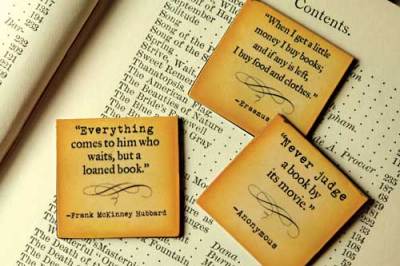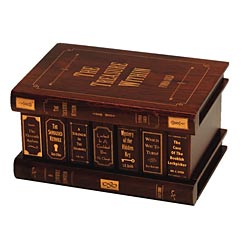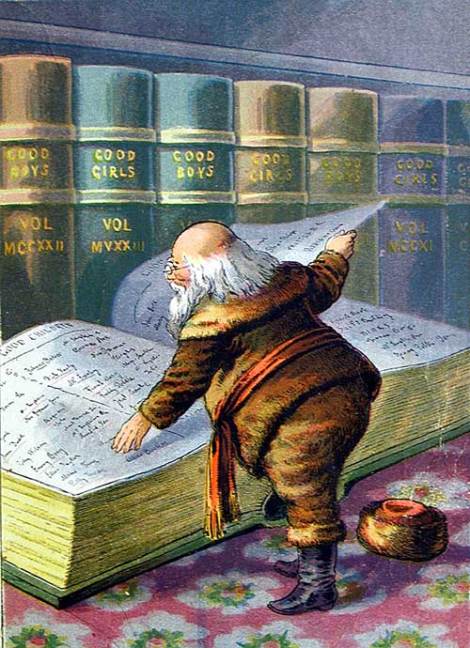Mr. Bradbury said in an interview last summer, "Libraries raised me. I don't believe in colleges and universities. I believe in libraries, because most students don't have any money. When I graduated from high school, it was during the Depression and we had no money. I couldn't go to college, so I went to the library three days a week for 10 years."
Mr. Bradbury said in an interview last summer, "Libraries raised me. I don't believe in colleges and universities. I believe in libraries, because most students don't have any money. When I graduated from high school, it was during the Depression and we had no money. I couldn't go to college, so I went to the library three days a week for 10 years."
When I obsess, I like to choose something small. Let others focus in on their dysfunctional relatives, or their receding hairline, or whether Fiji will disappear when the oceans rise. Been there, neuroticised about that.
I choose to hunt in my own pack for flotsam other obessive-compulsives would ignore as chump change.
And so this is how I began my quest for what I soon decided was the most under-appreciated out-of-print novel ever written. My obsession began on a Sunday in the early 1990s.
In this article, he also explains the cultural divide in how the U.S. government views the settlement, versus how it's viewed by European countries. France and Germany are worried about commercialization and monopoly. The U.S. Dept. of Justice is more concerned about "risk of market foreclosure."
The major change made to the GBS is that it is now narrowed to books published in the U.S., UK, Canada, and Australia. The bottom line: "GBS 2.0 does not therefore differ in essentials from GBS 1.0," Darnton writes. Which makes him, and many others in the book world, quite anxious.
Are you seeking a gift for a bookish type, either an avid reader or a book collector? Can't afford that first edition Gatsby in dustjacket but still want to give a gift that will appeal to the bibliophile? If so, welcome to my second annual list of Gift Ideas for the Bookish. To repeat the reasons for such a list from last year:
The holidays are fast approaching, and perhaps you are wondering what gift is appropriate for the bibliophile in your life. Although my enthusiasm for books is known far and wide, my family is always somewhat reticent to buy me books. They worry when they select a book for me that it's a book I already have or it's book I won't like. I'm assuming I am not the only bookish type to encounter such a situation. This year I'm suggesting a few bookish gifts for bibliophiles that do not force the buyer to second-guess a bibliophile friend or relative's particular literary taste. You can click on the links to find out pricing and shipping information for each item.
Magnetic bookmarks from Victorian Trading Company

The Treasure Within Secret Book Box

Record Book End -- The Clash Combat Rock

Nancy Drew book cover postcards

Miniature Marbleized Book Jewelry

Happy gift hunting!
From The St. Nicholas Center:
After the American Revolution, New Yorkers remembered with pride their colony's nearly-forgotten Dutch roots. John Pintard, the influential patriot and antiquarian who founded the New York Historical Society in 1804, promoted St. Nicholas as patron saint of both society and city. In January 1809, Washington Irving joined the society and on St. Nicholas Day that same year, he published the satirical fiction, Knickerbocker's History of New York, with numerous references to a jolly St. Nicholas character. This was not the saintly bishop, rather an elfin Dutch burgher with a clay pipe. These delightful flights of imagination are the source of the New Amsterdam St. Nicholas legends: that the first Dutch emigrant ship had a figurehead of St. Nicholas: that St. Nicholas Day was observed in the colony; that the first church was dedicated to him; and that St. Nicholas comes down chimneys to bring gifts. Irving's work was regarded as the "first notable work of imagination in the New World."The New York Historical Society is currently displaying Irving's History on the second floor in the case exhibit called "American Books: Hudson River Authors." A bit buried, perhaps, considering the season and the anniversary, but they redeem themselves with a holiday exhibit that traces the modern image of Santa from medieval bishop to jolly old guy in a red suit. You can also see the desk of Clement Clarke Moore (disputed author of "A Visit From St. Nicholas" (1822), better known as "Twas the Night Before Christmas").
Erica Olsen
Erica Olsen lives in Cortez, Colorado. She is the author of Recapture & Other Stories, a collection of short fiction.
In "Preserving the Library in the Digital Age," Tufts University history professor Benjamin L. Carp confesses, "I'll always be a stack rat." His vision of the future of libraries finds a place for digitized materials and the real thing. His essay appears in the November 2009 issue of The Readex Report. Readex publishes digital historical collections such as the Archive of Americana, which includes early American imprints and historical newspapers.
Poe was born in Boston, but left when his parents, traveling actors, made their exit. After the death of his mother, he was abandoned by his father and deposited upon a foster family in Richmond, VA. Years later, he returned to Boston, where he published several small volumes of poetry.
Out of 50 self-published copies of "Tamerlane," only 12 are still known to exist, and, of those, only two are in private hands.
The buyer at the Christie's auction was not identified.
The name "Tamerlane" is a Latinized version of "Timur Lenk," a 14th-century warlord, though little of the poem is historically accurate. In the poem, Tamerlane forsakes his love of a peasant girl in order to seek power, a decision he regrets, of course, once he's on his death bed. A warning to peasant girls everywhere: warlords make lousy childhood sweethearts.
Jonathan Shipley
Jonathan Shipley is a freelance writer living in Seattle. He’s written for the Los Angeles Times, Gather Journal, Uppercase, and many other publications.
Isn't it heart-warming to know that there are still serious writers and publishers out there - the kind who labor over short stories? Yesterday a new literary magazine was launched. The Folio Club, an independently published literary zine in book form, is dedicated to the art of prose narrative. It has an absolutely gorgeous cover (pictured above), designed by Onsmith, an indie artist known for his comic art.
This 96-page debut issue features the work of Romy Ashby (author of The Cutmouth Lady, editor of Goodie Magazine,and songwriter for the legendary rock band Blondie), and Mark Saba, a poet, storyteller, and essayist. Robert Pranzatelli is the founding editor, publisher, and a contributor. The idea behind the publication is to fuse underground values with polished literary prose, with a splash of comic art. Named for an unfinished sketch by Edgar Allan Poe that depicted a dysfunctional writer's group, The Folio Club is slated to publish twice yearly.
The Folio Club is available through Amazon for $9. A good buy for your literary zine or comic art collection...






